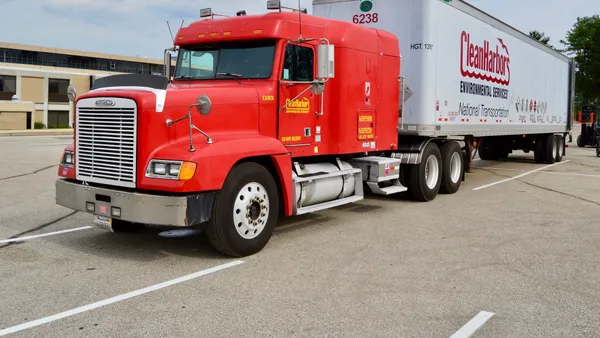UPDATED, May 10, 2018: The Conservation Law Foundation (CLF) has appealed a Massachusetts Department of Environmental Protection decision to extend the life of an ash monofill in Saugus. The appeal was filed exactly 30 days after the final permit approval, marking the deadline for interested parties to appeal.
In a statement, Kirstie Pecci, director of the Zero Waste Project at CLF, wrote, "The Wheelabrator landfill is the most dangerous in Massachusetts, and it is putting the health of nearby residents at risk ... Until the [Saugus Board of Health] determines whether the landfill is a potential danger to public health and safety as well as the environment, MassDEP legally cannot allow this project to move forward."
CLF reports that the board is also planning to appeal the decision, however it is currently unclear if that appeal was filed by the deadline.
Dive Brief:
- The Massachusetts Department of Environmental Protection (MassDEP) has issued final permit approval for Wheelabrator to extend the life of an ash monofill, next to its waste-to-energy facility in the town of Saugus, that is within the Rumney Marshes Area of Critical Environmental Concern. This will allow the company to change the gradient of two existing landfill valleys from 5% to 2% and create 400,000 cubic yards of new capacity.
- This decision is outlined in the 11th amendment to DEP's original 1989 administrative consent order. Per the amendment, Wheelabrator will pay $2.5 million into a state-managed account for mitigation work in the surrounding wetlands area. The DEP plans to use this to prevent erosion of waste from the former Dewey Daggett Landfill into the Pines River.
- Any interested parties now have 30 days to file an appeal. In a statement first reported by Boston 25, Wheelabrator said it is "open to a dialogue with the town about a long-term plan...that will enhance our economic and environmental value to the community." State Rep. RoseLee Vincent, who has a related bill pending in the state legislature, called the decision "irresponsible and reprehensible" and said "all options, including appeal and litigation are on the table."
Dive Insight:
This facility, formerly owned by Refuse Energy Systems Company (RESCO), opened in 1975 and is one of the oldest in the country. The adjacent landfill has been active in various forms since at least 1955. State regulation of the site became more frequent starting in the late 1980s into the early 1990s, when RESCO built the current monofill. Because removal of existing municipal solid waste and ash "was not feasible," this was done on top of the old unlined site. While the current site was initially expected to close in 1996 it has continued to receive extensions ever since.
That hasn't sat well with many area residents, some of whom believe the monfill site's proximity to local waterways is an environmental threat. Some also believe that the WTE facility is causing cancer and other illnesses.
This has led to votes of opposition from local governments over the years and was on display during an emotional two-and-half-hour hearing last fall after the DEP granted provisional approval. While many spoke in opposition, others did stand up to support the site's community contributions. They were met with vocal pushback from the crowd on that November evening in Saugus High School's auditorium.
The DEP received an estimated 1,820 comments from local residents, officials and environmental groups about many of these issues and provided summarized responses in its final decision. Highlights include the agency's assertion that none of the landfill is within the 100-year floodplain, a 2016 study found no link to cancer among local residents and the site technically never had to close in 1996.
Aside from requiring Wheelabrator to update plans for back-up power to run leachate collection and treatment, the agency didn't indicate any change in its initial decision based on these comments. The $2.5 million mitigation payment — plus another $100,000 for planning fees and free tipping for an estimated 13,600 cubic yards of soil and refuse that will excavated — is the main concession to come out of this agreement. Wheelabrator is not required to make this payment if the monfill project doesn't proceed for any reason.
Based on past actions from environmental groups more resistance can be expected over both this project and the future of the WTE facility itself. Advocates involved in the Boston "zero waste" planning process could also raise the issue when the city's disposal contracts go up for bid in 2019. Wheelabrator can be expected to fight hard to keep this asset open at a time when U.S. WTE growth has slowed and a moratorium on new combustion facilities remains in place for Massachusetts.











